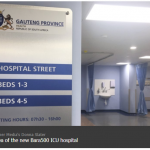Gauteng progresses township economic development agenda
The Bill aimed at revamping Gauteng’s township economy is expected to be passed by the end of June 2021.
Despite some delays caused by the Covid-19-related restrictions, the Gauteng Township Economic Development Bill has been gazetted and is currently undergoing public consultations.
It is expected to be introduced in the legislature before the end of March 2021, said Gauteng Premier David Makhura during his end-of-year political report to a virtual sitting of the Gauteng provincial legislature.The move was in line with the July 2019 State of the Province Address, during which Makhura said that the province aimed to ease the regulatory burden facing township-based enterprises, and make starting and formalising a business in townships simpler and seamless.
The draft Bill is expected to provide a framework for the promotion and development of township businesses and bring the historically disadvantaged into productive mainstream activities. The primary aim is to empower and support local township-based businesses by creating an enabling environment for the growth of the township economy, which is valued at about R200-billion a year. “Although Covid-19 caused some delays, public consultations are taking place and the debate on the Bill has generated a lot of enthusiasm in small, medium-sized and microenterprises and the informal sector,” Makhura commented.
The draft Gauteng Township Economic Development Bill is aligned to Gauteng’s Township Economy Revitalisation (TER) Strategy.
The Gauteng provincial government remains focused on its ‘Growing Gauteng Together’ (GGT2030) plan of action tabled in February, through the Transformation, Modernisation and Reindustrialisation programme of the Gauteng City Region; however, the Covid-19 pandemic “profoundly changed” the context in which the province’s vision and programme is to be implemented, he continues. Makhura’s end-of-year political report focused on how the Gauteng provincial government will accelerate the implementation of its programmes towards realisation of GGT2030.
South Africa’s economy has been ravaged by the lockdowns and restrictions amid the global pandemic. By the second quarter of 2020, the country lost 2.2-million jobs, 661 000 of which were in Gauteng. Gauteng’s overall labour participation rate decreased from 71.3% to 57.6%, while that of municipalities fell below 60%.
“The pandemic has exposed and accentuated other epidemics and pandemics: inequality and hunger, crime and corruption, unemployment and poverty, gender-based violence and femicide, mental illness and other morbidities, economic and financial meltdown, besides others,” Makhura points out.
“[However,] our mandate has not changed.” While the pandemic derailed the implementation of the programme, with the easing of lockdown restrictions, government is now able to focus on the implementation of its programme.



